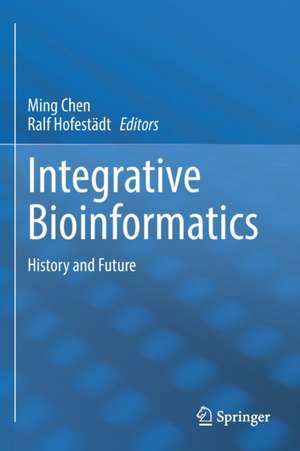Integrative Bioinformatics: History and Future
Editat de Ming Chen, Ralf Hofestädten Limba Engleză Paperback – 17 apr 2023
| Toate formatele și edițiile | Preț | Express |
|---|---|---|
| Paperback (1) | 1036.85 lei 6-8 săpt. | |
| Springer Nature Singapore – 17 apr 2023 | 1036.85 lei 6-8 săpt. | |
| Hardback (1) | 1043.97 lei 6-8 săpt. | |
| Springer Nature Singapore – 16 apr 2022 | 1043.97 lei 6-8 săpt. |
Preț: 1036.85 lei
Preț vechi: 1091.42 lei
-5% Nou
Puncte Express: 1555
Preț estimativ în valută:
198.41€ • 207.84$ • 164.43£
198.41€ • 207.84$ • 164.43£
Carte tipărită la comandă
Livrare economică 08-22 aprilie
Preluare comenzi: 021 569.72.76
Specificații
ISBN-13: 9789811667978
ISBN-10: 9811667977
Pagini: 386
Ilustrații: XI, 386 p. 1 illus.
Dimensiuni: 155 x 235 mm
Greutate: 0.56 kg
Ediția:1st ed. 2022
Editura: Springer Nature Singapore
Colecția Springer
Locul publicării:Singapore, Singapore
ISBN-10: 9811667977
Pagini: 386
Ilustrații: XI, 386 p. 1 illus.
Dimensiuni: 155 x 235 mm
Greutate: 0.56 kg
Ediția:1st ed. 2022
Editura: Springer Nature Singapore
Colecția Springer
Locul publicării:Singapore, Singapore
Cuprins
Chapter 1. Integrative Bioinformatics: History and Perspective.- Chapter 2. From Genotypes to Phenotypes - A Plant Perspective on Current Developments in Data Management and Data Publication.- Chapter 3. Research data resources for epidemiology.- Chapter 4. Data Warehousing of Life Science Data.- Chapter 5. Automation in Graph-Based Data Integration and Mapping.- Chapter 6. DaTo: an Integrative Web Portal for Biological Databases and Tools.- Chapter 7. The Use of Data Integration and Knowledge Graphs in Modern Molecular Plant Breeding.- Chapter 8. Integrative data analysis and exploratory data mining in biological knowledge graphs.- Chapter 9. Exploring plant transcription factor regulatory networks.- Chapter 10. Microbiome and big-data mining.- Chapter 11. Data Integration Applications in Medical Information Systems.- Chapter 12. Visualising Metabolic Pathways and Networks: Past,Present,Future.- Chapter 13. Comprehensive open-source Petri net toolchain for modeling and simulation in systems biology.- Chapter 14. Immersive Exploration of Cell Localization Scenarios using VR, Spatialized Video Communication and Integrative Bioinformatics.- Chapter 15. IoS: a Needed Platform for Scientific Workflow Management.- Chapter 16. Revealing genotype-phenotype interactions: The AgroLD experience and challenges.- Chapter 17. Interactive Data Analyses Using Tbtools.- Chapter 18. Analyzing multi-omic data with integrative platforms.
Notă biografică
Ming Chen is the Director of the Bioinformatics Laboratory at the College of Life Sciences, Zhejiang University (China). He received his PhD in Bioinformatics from Bielefeld University (Germany). His group research work covers bioinformatics, systems biology, non-coding RNA transcriptomics, and precision medicine. He published over 200 papers on peer-viewed journals. He is the President of the Bioinformatics Society of Zhejiang Province, China; Deputy director of Chinese Society for "Modeling and Simulation of Biological Systems", Committee executive member of Chinese Society for "Computational Systems Biology" and Committee member of Chinese Societies for "Functional Genomics & Systems Biology", "Biomedical Information Technology" and "Biophysics (Bioinformatics) ".
Ralf Hofestädt studied Computer Science and Bioinformatics at the University of Bonn. He finished his PhD in Computer Science (University Bonn) and his Habilitation (Applied Computer Science and Bioinformatics) at the University of Koblenz. He was Professor for Applied Computer Science at the University of Magdeburg. Now he is Professor for Bioinformatics and Medical Informatics at the University Bielefeld. He launched the Journal of Integrative Bioinformatics in early 2000’s. The research topics of the department concentrate on biomedical data management, modeling and simulation of metabolic processes, parallel computing and multimedia implementation of virtual scenarios.
Ralf Hofestädt studied Computer Science and Bioinformatics at the University of Bonn. He finished his PhD in Computer Science (University Bonn) and his Habilitation (Applied Computer Science and Bioinformatics) at the University of Koblenz. He was Professor for Applied Computer Science at the University of Magdeburg. Now he is Professor for Bioinformatics and Medical Informatics at the University Bielefeld. He launched the Journal of Integrative Bioinformatics in early 2000’s. The research topics of the department concentrate on biomedical data management, modeling and simulation of metabolic processes, parallel computing and multimedia implementation of virtual scenarios.
Textul de pe ultima copertă
This book provides an overview of the history of integrative bioinformatics and the actual situation and the relevant tools. Subjects cover the essential topics, basic introductions, and latest developments; biological data integration and manipulation; modeling and simulation of networks; as well as a number of applications of integrative bioinformatics. It aims to provide basic introduction of biological information systems and guidance for the computational analysis of systems biology. This book covers a range of issues and methods that unveil a multitude of omics data integration and relevance that integrative bioinformatics has today. It contains a unique compilation of invited and selected articles from the Journal of Integrative Bioinformatics (JIB) and annual meetings of the International Symposium on Integrative Bioinformatics.
Caracteristici
Contributed by many distinguished experts worldwide Provides an overview of the history of Integrative Bioinformatics Offer a reference for analyzing omic data aiming at a deeper understanding of the mechanism of life
